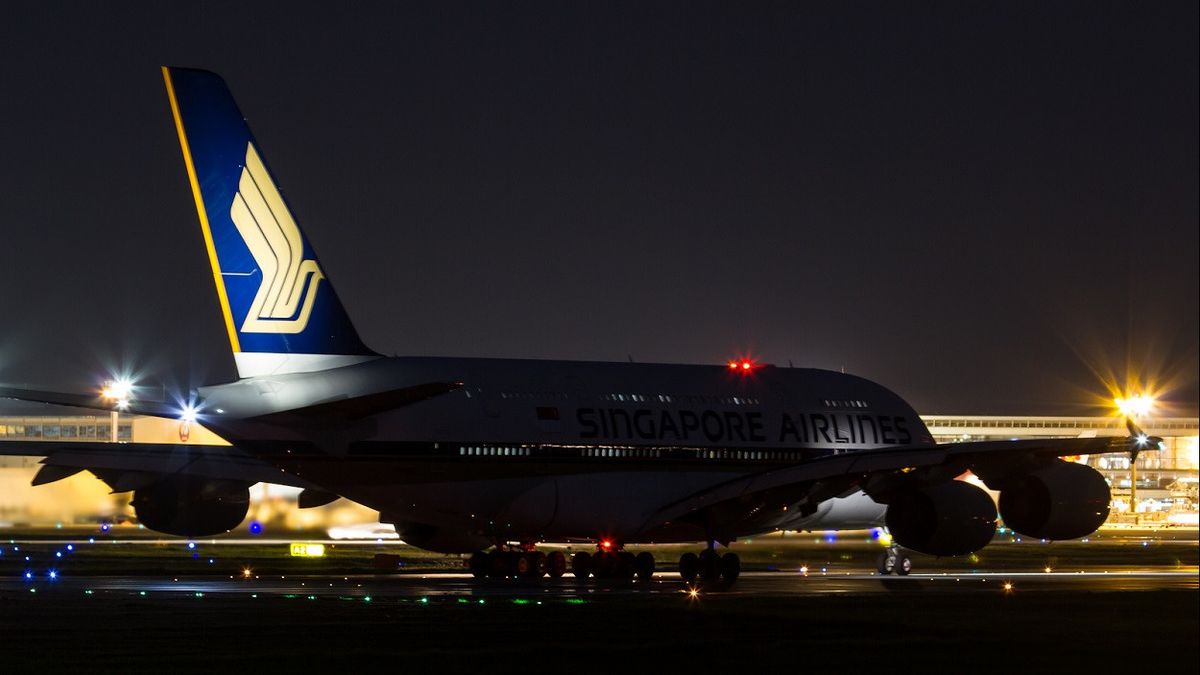JAKARTA - A number of Singapore Airlines passengers described the situation they experienced when the plane experienced turbulence while flying from London to Singapore on Tuesday.
The plane was carrying 221 passengers and 18 crew when it experienced severe turbulence in the Irrawaddy Basin, Myanmar, causing people and items to be thrown in the cabin.
A British man Geoff Kitchen (73) died of a suspected heart attack. Meanwhile, more than 30 people were injured when the flight experienced turbulence while food service was taking place.
Briton Andrew Davis described a "terrifying scream that sounded like a thud" in the first few seconds of the incident.
"The thing I remember most is seeing objects flying in the air," he said, according to the BBC, May 22.
"I was splashed with coffee. The turbulence was extremely severe," he continued.
Another passenger said the plane suddenly started to "tilt" and "shake".
"I started to prepare for what was happening and suddenly there was a drastic drop, so that everyone who was sitting and not wearing a seat belt was thrown straight to the ceiling," Dzafran Azmir, a 28-year-old student, told Reuters.
"Some people hit their heads on the luggage compartment above and it was dented, they hit the place where the lights and masks were and went straight through it," he added.
Another British citizen, Jerry (68) is traveling to Australia to attend his son's wedding. He said there was no warning before the "plane crashed".
"My head hit the ceiling, my wife too, some poor people who were walking around ended up falling over," he said bitterly.
Meanwhile, Allison Barker said she received a message from her son, Josh, who was on the plane en route to Bali: "I don't want to scare you, but I'm on a crazy flight. The plane is about to make an emergency landing. I love you guys all."
After that message, he waited for two hours before hearing from her again.
"One minute, he was just sitting wearing a seat belt, the next minute, he must have passed out because he was on the floor with other people," he told the BBC.
Josh, he said, only suffered minor injuries, but he was worried that the incident that almost killed him could have long-term impacts.
A British man who suffered a neck injury said he and his family were "pretty lucky" that no one died.
"There was no shaking at all and then I hit the roof. All of a sudden, I was up like that.
"My son was thrown to the floor two rows behind me. I heard a man hit the roof in the toilet and he was also quite badly injured," he said, speaking from a hospital in Thailand.
The Boeing 777-300ER aircraft bound for Singapore was diverted to Bangkok, Thailand after an incident in the air, making an emergency landing at 15:45 p.m. local time (08:45 a.m. GMT).
Singapore Airlines said all 31 people on board were taken to hospital and the airline offered its deepest condolences to Kitchen's family.
Meanwhile, airline officials said that after flying for about 10 hours, the plane encountered "sudden extreme turbulence" in Myanmar's Irrawaddy Basin at an altitude of 37,000 feet.
The company said it was working with Thai authorities to provide medical assistance to passengers, and was sending a team to Bangkok to provide any additional assistance needed.
Singapore Airlines also provided details about the nationalities of those on the flight, including 47 people who were from the UK.
Separately, Singapore Transport Minister Chee Hong Tat said the government would provide assistance to passengers and their families.
"I am deeply saddened to learn about the incident on board Singapore Airlines flight SQ321 from London Heathrow to Singapore," he posted on Facebook.
Turbulence is most often caused by aircraft flying through clouds, but there is also "clear air" turbulence that is not visible on aircraft weather radar.
SEE ALSO:
"Severe turbulence-related injuries are relatively rare in the context of the millions of flights operated," aviation expert John Strickland told the BBC.
"However, severe turbulence can be dramatic and cause severe injury or unfortunately in this case death," he continued.
Flight crews are also trained on how to respond to turbulence, he said.
"It is not without reason that airlines recommend keeping seat belts loosely fastened during flights, both for long and short flights," he added.
The English, Chinese, Japanese, Arabic, and French versions are automatically generated by the AI. So there may still be inaccuracies in translating, please always see Indonesian as our main language. (system supported by DigitalSiber.id)












